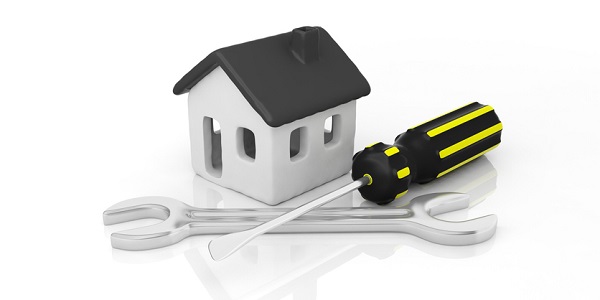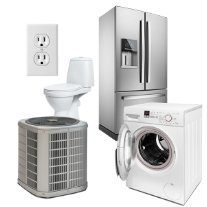You’ve just finished the closing paperwork for your home. Your mortgage lender required that you buy a homeowners insurance policy, so you did. During the first few weeks of home ownership, you notice that you’re getting letters from a warranty company or two urging you to purchase a Home Warranty Service Agreement in addition to your insurance policy.
If you’re like most homeowners, you ask yourself, “Why is this warranty company contacting me? I have a homeowners insurance policy. Did I miss something? Do I need another policy or will my homeowners insurance cover everything?”
Today, we’ll help you answer that question by showing you the difference between a Home Warranty Service Agreement and a homeowners insurance policy.
What does homeowners insurance cover?
An insurance policy for your home gives your house (and often the personal property inside) coverage against damage caused by problems like fire, wind, theft, vandalism and more. This policy also typically provides liability coverage if someone accidentally gets hurt or dies on your property.
It’s important to note that a homeowners policy usually doesn’t offer standard coverage that includes floods or earthquakes. Those natural disasters often require additional coverage and must be purchased as an addition to the standard policy.
An insurance policy for your home is required by virtually all mortgage lenders. So, if you need a mortgage, you also need home insurance.
What is a Home Warranty Service Agreement?
There are several types of home warranty products that depend on the warranty company you choose. But the coverage that matters to you, the homeowner, is the systems and appliances home warranty.
A systems and appliances home warranty, also known as a Home Warranty Service Agreement, helps reduce the cost of repair or replacement when home systems (like your air conditioner or water heater) or home appliances (like your built-in microwave) break down from routine wear and tear.
Though a Home Warranty Service Agreement is optional, it’s also a good way to reduce the cost of home ownership.
- Did you know that 7 in 10 homes experience a breakdown to their systems or appliances in any given year?
- Did you know that the upfront cost to address breakdowns to systems and appliances ranges from over $400 to $6,400 on average?
- Would you be able to afford those costs if you weren’t expecting them and didn’t have coverage?
With a Home Warranty Service Agreement from 2-10 Home Buyers Warranty (2-10 HBW), you protect yourself against the unexpected. Rather than being forced to pay those huge dollar amounts up front, you’d pay a Service Fee (or deductible) to the Service Contractor for the visit and diagnosis. Then, 2-10 HBW would determine your coverage eligibility and provide authorization or a repair or replacement.
After the service provider completes their repair or replacement of the problematic systems or appliances, we pay the remaining cost up to the limits in your service contract. 2-10 HBW gives you all limits and exclusions up front and transparently in our service contract.
Does homeowners insurance cover it, or does a Home Warranty Service Agreement?
Here are some common breakdowns and problems you might run into as a homeowner, along with which coverage covers it.
- Problem: Your refrigerator stops chilling from routine use.
Solution: Your Home Warranty Service Agreement covers that. File a claim and repair the damage for a fraction of the out-of-pocket cost.
- Problem: Your heat pump stops working after a hail storm.
Solution: Most likely, your homeowners insurance covers the damage, but your warranty policy would not cover any damage, because hail—rather than routine use—caused the damage.
- Problem: Your dishwasher breaks from routine use and causes damage to your kitchen floor.
Solution: In this scenario, you’d use both types of coverage. Your Home Warranty Service Agreement covers the damage to your dishwasher, and your homeowners insurance coverage may address the damage to your floor.
- Problem: A kitchen fire does damage to your stove.
Solution: You would use your home insurance coverage, especially if there is other damage related to the fire.
Importance of carrying a homeowner policy and a Home Warranty Service Agreement
For the most comprehensive coverage, you should consider both a Home Warranty Service Agreement and a homeowner policy. For a deeper dive on why you should complement your homeowner’s policy with a warranty, read this article.
In short, if you don’t have a Home Warranty Service Agreement that complements your homeowner policy, you’re leaving your budget vulnerable and making life harder than it needs to be. A Home Warranty Service Agreement combined with a homeowner policy makes your protecting your home from routine damage more affordable.
What about a structural warranty?
A structural warranty is a warranty that your builder provides and 2-10 HBW administers. It can protect new-construction homes against qualified structural defects to load-bearing elements. Though homeowners can’t purchase this directly, you can encourage your builder to join 2-10 HBW’s warranty program. 2-10 HBW is the leading provider of structural warranties. For more information about why a structural warranty from 2-10 is important, click here.
2-10 HBW offers the most comprehensive home warranty coverage for homeowners. Let us help you protect your home.
Related content
Why You Should Have Both a Home Warranty and Homeowners Insurance









